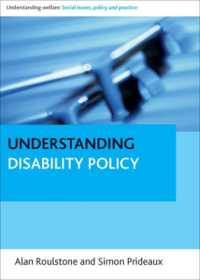- ホーム
- > 洋書
- > 英文書
- > Politics / International Relations
Full Description
Democratic politics is expensive. In United States (US) presidential elections, for instance, total spending, including funding by the candidate-supporting political action committees, now exceeds $6.5 billion. Who should bear these costs? Should the state fund political parties and their campaigns, or should most of the funding come from private citizens?
In the US, election campaigns are largely funded by private donations from individuals and corporate entities, whereas in Germany, the state is the main funder of electoral politics through subventions to parties. In some other countries, parties have been able to raise most of what they need internally by charging membership dues or, more exceptionally, by relying on a wealthy patron. Across these countries, and in many more, however, there have been numerous scandals and controversies involving political finance, which pose a serious challenge to fundamental democratic principles.
Matteo Bonotti and Zim Nwokora analyse the nature of these democratic risks and how they differ across various models of political finance. They argue that political finance rules ought to counterbalance the weaknesses of the party system they are being used alongside. To do so, political finance rules and party systems should be assessed together, in terms of three distinctive normative dimensions-collegiality, systemic voice and systemic accountability-which capture what parties, at their best, can contribute to democratic politics. Money, Parties, and Democracy sets out a framework for evaluating political finance systems so that they can be designed or reformed to better support good governance.
Contents
List of Figure
List of Tables
Introduction
1: The Normative Theory of Partisanship
2: Concentrated Party Systems and the Normative Theory of Partisanship
3: Multiparty Systems and the Normative Theory of Partisanship
4: Political Finance Models and the Normative Theory of Partisanship: Towards a Civic Model
5: Contextualizing the Civic Model of Political Finance
6: Applying the Framework in Practice
References
Index








